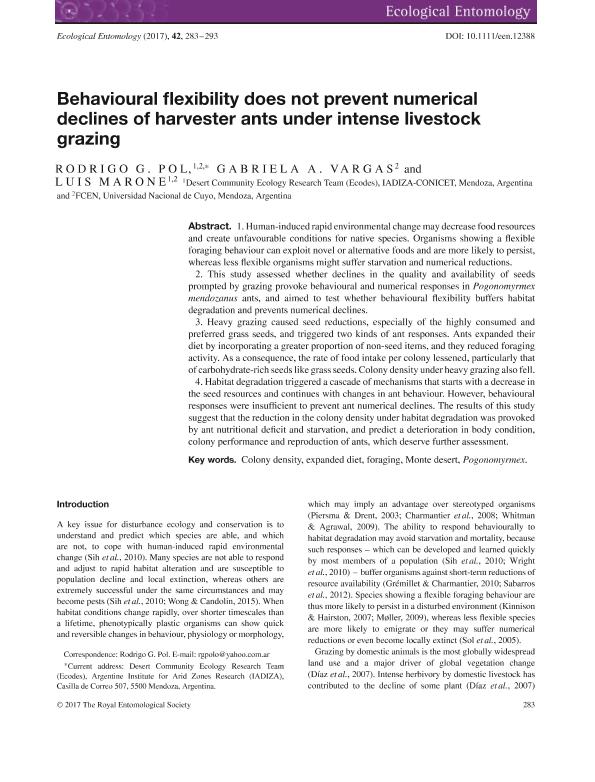Artículo
Behavioural flexibility does not prevent numerical declines of harvester ants under intense livestock grazing
Fecha de publicación:
06/2017
Editorial:
Wiley Blackwell Publishing, Inc
Revista:
Ecological Entomology
ISSN:
0307-6946
Idioma:
Inglés
Tipo de recurso:
Artículo publicado
Clasificación temática:
Resumen
1. Human-induced rapid environmental change may decrease food resources and create unfavourable conditions for native species. Organisms showing a flexible foraging behaviour can exploit novel or alternative foods and are more likely to persist, whereas less flexible organisms might suffer starvation and numerical reductions. 2. This study assessed whether declines in the quality and availability of seeds prompted by grazing provoke behavioural and numerical responses in Pogonomyrmex mendozanus ants, and aimed to test whether behavioural flexibility buffers habitat degradation and prevents numerical declines. 3. Heavy grazing caused seed reductions, especially of the highly consumed and preferred grass seeds, and triggered two kinds of ant responses. Ants expanded their diet by incorporating a greater proportion of non-seed items, and they reduced foraging activity. As a consequence, the rate of food intake per colony lessened, particularly that of carbohydrate-rich seeds like grass seeds. Colony density under heavy grazing also fell. 4. Habitat degradation triggered a cascade of mechanisms that starts with a decrease in the seed resources and continues with changes in ant behaviour. However, behavioural responses were insufficient to prevent ant numerical declines. The results of this study suggest that the reduction in the colony density under habitat degradation was provoked by ant nutritional deficit and starvation, and predict a deterioration in body condition, colony performance and reproduction of ants, which deserve further assessment.
Palabras clave:
Colony Density
,
Expanded Diet
,
Foraging
,
Monte Desert
,
Pogonomyrmex
Archivos asociados
Licencia
Identificadores
Colecciones
Articulos(IADIZA)
Articulos de INST. ARG DE INVEST. DE LAS ZONAS ARIDAS
Articulos de INST. ARG DE INVEST. DE LAS ZONAS ARIDAS
Citación
Pol, Rodrigo Gabriel; Vargas, Gabriela Alejandra; Marone, Luis; Behavioural flexibility does not prevent numerical declines of harvester ants under intense livestock grazing; Wiley Blackwell Publishing, Inc; Ecological Entomology; 42; 3; 6-2017; 283-293
Compartir
Altmétricas




